中考英语重点句型归纳和应用 (3)
【中考英语总复习 必备知识】表达意见和建议的句型-中考英语复习必背句型(人教版)

表达意见和建议的句型一、陈述个人意见、看法的句型(1)I'm afraid...恐怕······例句①I'm afraid we can't finish it on time.恐怕我们不能按时完成.②I'm afraid I have to leave now.我恐怕现在得走了.③I'm afraid you are wrong.恐怕你错了.④There's little time left. I'm afraid we have to make a decision as soon as possible.时间所剩无几,恐怕我们得尽快作出决定了.⑤-What a strong sandstorm! Will it last long? 多么厉害的沙尘暴呀!它会持续很长时间吗?-I'm afraid so. We're getting into the sandstorm season now.恐怕是吧.我们现在已经进入沙尘暴较多的季节了.⑥-Can we be on time?我们能准时吗?-I'm afraid not.恐怕不能.(2)I think (that)...我认为······该句型用于说话者陈述自己对于某人或某事物的看法,强调的是个人主观意愿,与客观事实可能存在差异.that 是一个连接词,在句中引导宾语从句,可以省略.“I think(that)...”的否定形式为“I don't think(that)...”,意为“我认为······不”,表示主观的否定意见和看法. I think so意为“我认为如此”,I don't think so意为“我不这样认为”.例句①I think the volunteers who saved people in trouble should be regarded as heroes as well.我认为那些拯救受困人员的志愿者也应该被视为英雄.②I think(that)Tom is honest.我认为汤姆很诚实.③I think he will come to see us soon.我认为他不久就会来看我们.④I think that is a good idea.我认为那是一个不错的主意.⑤I don't think my parents will agree.我认为我的父母不会同意.⑥I don't think he will join us.我认为他不会加入我们.⑦-Are you sure you can do well in today's test, Lucy?露西,你确信你今天考试能考得不错吗?-I think so. I've got everything ready.我认为如此,我已经做好准备了.(3)I think/find/feel it+形容词+to do sth我认为/发现/感觉做某事······这一结构中,it为形式宾语,真正的宾语是后面的动词不定式.例句①I think it impolite to cut in line.我认为插队是不礼貌的.②I think it easy to make friends with Mr. White.我认为和怀特先生交朋友很容易.③I think it great to join in their party tonight.我认为今晚参加他们的聚会是非常棒的.④I find it easy to learn English well.我发现学好英语是很容易的.⑤I find it hard to teach my younger brother to paint.我发现教我弟弟画画不容易.⑥I feel it necessary to help the old.我感到帮助老人是必要的.⑦I feel it possible to finish my homework before nine o'clock.我觉得九点前完成作业是可能的.(4)I wonder...我想知道······例句①I wonder if/whether he will come.我想知道他是否会来.②I wonder if/whether the house is big enough.我想知道这房子是不是足够大.③I wonder who told him the seeret.我想知道谁把秘密告诉了他.④I wonder how James is getting on.我想知道詹姆斯的近况.⑤I wonder where he spent his childhood.我想知道他的童年是在哪里度过的.⑥I wonder which he chose at last.我想知道他最后选了哪个.(5)I hope...我希望······“I hope...”句型用来表达自己的愿望,后面可以跟动词不定式或that引导的宾语从句,that可以省略,从句的时态多用一般现在时或一般将来时.例句①I hope you have a good trip.我希望你旅途愉快.②I hope to live beside the river.我希望能住在河边.③I hope one day our dreams will come true.我希望有一天我们的梦想能够成真.④I hope you will like it.我希望你会喜欢它.(6)I feel like (doing) sth....我想(做)某事······例句①I feel like a cup of coffee.我想要一杯咖啡.②When you feel like giving up, think of your goal.当你想要放弃的时候,想想你的目标.③I feel like going to bed. I am tired.我想要去睡了.我累了.④I don't feel like going to the cinema tonight with you.我今天晚上不太想和你一起去看电影.二、征求对方意见或向对方提建议的句型(1)What do you think...?你认为······?句型“What do you think...?”用来询问对方对某事物或某人的看法或建议,表示客气且正式地征询对方意见,有时也是礼貌用语.其中do you think 在句中不充当句子的成分,置于特殊疑问词之后,其后的时态、动词的形式均不受do you think的影响.例句①What do you think is good for children?你认为什么对儿童有益处?②What do you think is the best way of reading?你认为什么是阅读的最佳方法?(2)What do you think of...?你认为······怎么样?句型“What do you think of...?”相当于“How do you like...?”或者“How do you feel about...?”,是一种交际用语,用来询问对方对某事物或某人的看法.其答语通常为表示评价的形容词(短语)或句子.例句①-What do you think of the film?=How do you like the film?=How do you feel about the film?你觉得这部电影怎么样?-I don't mind it.我不介意它.②-What do you think of this book? =How do you like this book? =How do you feel about this book?你认为这本书怎么样?-Very interesting.非常有趣.③-What do you think of his answer? =How do you like his answer?=How do you feel about his answer? 你认为他的回答怎么样?-Not bad.还不错.④-What do you think of her dress? =How do you like her dress?=How do you feel about her dress?你觉得她的连衣裙如何?-Very beautiful!非常漂亮!(3)Would you like+名词/动词不定式?你想要······吗?此句型用来向对方委婉地提出建议,would在这里不表示过去时,仅表示语气上的客气与委婉.其中“Would you like sth.?”的肯定答语为:Yes, please.;否定回答为:No, thanks.而“Would you like to do sth.?”的肯定答语为;Yes, I'd like/love to./Certainly./Sure.;否定回答一般不太直接,同时陈述一些相应理由.例句①Would you like some hot water?来点儿热水好吗?②Would you like a cup of tea?来杯茶好吗?③Would you like to say something? 你愿意说点儿什么吗?④Would you like to stay here one more day? 你要不要在这儿多待一天?⑤-Would you like some dumplings for lunch?午饭你想吃饺子吗?-No, thanks. I'm full.不,谢谢.我不饿.⑥-Would you like to go out to play basketball with me? 你愿意和我一起出去打篮球吗?-I'd love to, but I should finish my homework first.我愿意,但我应该首先完成作业.(4)Will/Would you please(not)...?请你(不)······好吗?此句型表示有礼貌的请求,句尾要用升调,回答常用“Of course./Certainly./Yes, I'll be glad to./No, I'm s orry.”等. 例句①Will you please turn on the TV?请你打开电视机好吗?②Your room looks dirty. Will you please make it clean?你的房间看上去很脏,你可不可以打扫一下?③Will you please not argue with him?你不要和他争论好吗?④Would you please tell me the truth? 你能不能告诉我实情?⑤Would you please take care of my garden while we are away?在我们离开期间,你能不能帮我们照看一下花园?⑥The TV set has been on for several hours. Would you please turn it off?电视机已经开了几个小时了.请把它关掉,好吗?⑦It is so noisy here that I can't hear what you said. Could you please say it again?这里如此吵闹以至于我不能听清楚你说的话.你可以再说一遍吗?(5)Would/Do you mind(one's) doing...? 你是否介意做······?回答该问句时,如要表示“没关系,我不在乎.”可以说:Of course not./No, not at all./No, go ahead.而表示不希望对方做此事时往往要委婉回答.如:I'm sorry, you'd better not.(对不起,你最好不要这样做.)例句①Would you mind opening the door for me?你介不介意为我开门?②Would you mind saying it again?你介意再说一遍吗?③Do you mind my smoking here? 我在这里吸烟你介意吗?④Would you mind her sitting here?你介意她坐在这儿吗?⑤Do you mind if I tell him the truth?如果我对他讲实情你介意吗?⑥Would you mind waiting outside for a moment.你介意在外面等一会儿吗?⑦Would you mind not putting up the ads on the wall? 请不要在墙上张贴广告好吗?(6)What/How about...?······怎么样?例句①What/How about a glass of juice? 来杯果汁怎么样?②What/How about Friday?周五好吗?③What/How about sending him an e-mail?给他发封电子邮件怎么样?④What about going hiking and relaxing ourselves? 去远足放松一下怎么样?⑤How about sharing your worries with your parents?与父母分享一下你的担忧怎么样?(7)Why don't you...?/Why not...?为什么不······?例句①Why don't you look this word up in the dictionary?你为什么不在词典里查一下这个单词呢?②Why don't you join an English club to practice speaking English?为什么不参加英语俱乐部来练习说英语呢?③Why not come in and sit down?何不进来坐一下?④-Why not go to Lao She Teahouse tonight?今天晚上为什么不去老舍茶馆呢?-Sounds great.听起来好极了.(8) You'd better(not) do sth.你最好(不要)做某事.例句①You'd better hurry up.你最好快一点儿.②You'd better stay at home today.你今天最好待在家里.③You'd better buy an English dictionary.你最好买一本英语词典.④You'd better not watch TV all the time.你最好不要老是看电视.⑤You'd better not ask him for help.你最好别向他求助.⑥It's rather hot in the room. You'd better not close the windows or the door.房间里相当热.你最好不要关窗户或门.。
(完整word版)中考英语语法重点:句子成分、基本句、状语、宾语、定语从句、it

一、句子成分:1.主语:主语(Subject)是一个句子所叙述的主体,一般位于句首。
主语可由名词、代词、数词、不定式、动名词、名词化的形容词和主语从句等表示。
例如:The sun rises in the east。
(名词)He likes dancing. (代词)Twenty years is a short time in history。
(数词)Seeing is believing. (动名词)To see is to believe. (不定式)What he needs is a book. (主语从句)2. 谓语谓语 (Predicate) 说明主语所做的动作或具有的特征和状态。
动词在句中作谓语,一般放在主语之后。
谓语的构成如下:1、简单谓语:由一个动词或动词短语构成。
如:He practices running every morning。
The plane took off at ten o'clock。
2、复合谓语:(1)由情态动词或其他助动词加动词原形构成,或由各种时态构成。
如:You may keep the book for two weeks.He has caught a bad cold.(2)由系动词加表语构成。
如:We are students.注意:谓语与主语在人称与数方面要保持一致3.表语表语(Predicative)用以说明主语的性质、特征、状态与身份,它一般位于系动词(如be, become, get, look, grow, turn, seem等)之后.例如:He is a teacher。
注意:系动词(Linking verb)用于连接主语和表语,说明主语的状态,性质特征和身份等常见的系动词有: be, sound(听起来), look(看起来), feel(摸起来),smell(闻起来),taste(尝、吃起来), remain(保持,仍是), feel(感觉)….It sounds a good idea。
天津中考英语考点总结(优选3篇)

天津中考英语考点总结(优选3篇)天津中考英语考点总结第1篇英语语法是针对英语语言进行研究后,系统地总结归纳出来的一系列语言规则。
要想学好英语,一定要学好英语语法。
定冠词1、特指某些人或事物,或者谈话中提到过的人和事。
例: is the house where my father once lived.2、用在方位、方向名词前,表示特定方向或方位。
例:the east 东方,the left 左边,at the top 在顶上3、用在某些乐器前,表示演奏。
例:play the piano/violin/guitar4、镇巧指世上独一无二的事物,用在海洋、江河、海峡等地理名词前或者普通名词构成的国家名称、机关团体等专有名词前。
例:the sun 太阳 the moon 月亮 the earth 地球 the USA 美国the Great Wall 长城 the Huanghe River 黄河5、用在序数词和形容词最高级前,以及形容词only,very,same等前面。
例:This is the second time that you have been late this month.这是你这个月第二次迟到。
6、与复数名姿旅薯词连用,表示整个群体。
天津中考英语考点总结第2篇初三英语语法总结归纳【1、一般现在时的用法】1) 经常性或习惯性的动作,常与表示频度的时间状语连用。
时间状语(提示词):every…, sometimes, at…, on Sunday。
例如:I leave home for school at 7 every morning. 每天早上我七点离开家。
2) 客观真理,客观存在,科学事实。
例如:The earth moves around the sun. 地球绕太阳转动。
Shanghai lies in the east of China. 上海位于中国东部。
3) 表示格言或警句。
人教版初中英语中考复习知识点归纳总结全册
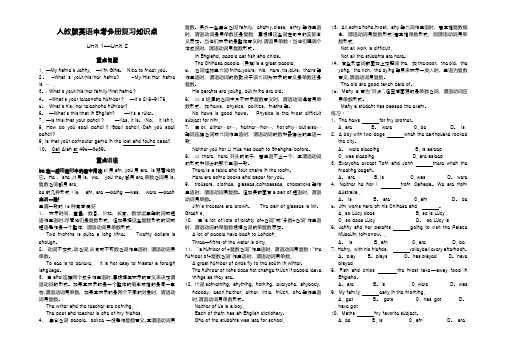
人教版英语中考分册复习知识点Unit 1—Unit 2重点句型1. —My name’s Jenny. —I’m Gina。
Nice to meet you。
2。
-What’s your/his/her name? -My/His/Her name is … .3。
What’s your/his/her family/first name?4。
-What’s your telephone number?—It’s 218-9176. 5。
What’s his/ her telephone number?6。
—What’s this/that in English? —It's a ruler。
7. —Is this/that your pencil?—Yes, it is。
/No,it isn’t.8. How do you spell pencil?/Spell pencil./Can you spell pencil?9. Is that your computer game in the lost and found case? 10。
Call Alan at 495—3539。
重点语法be在一般现在时中的基本用法:I用am, you用are,is跟着他她它。
He ,she ,it用is,we,you they都用are.单数名词用is,复数名词都用are.be的几种形式:is,am, are —being —was,were —been 主谓一致:主谓一致的15种常考情况:1.表示时间,重量,数目,价格,长度,数学运算等的词或短语作主语时,尽管他们是复数形式,但如果把这些复数形式的词或短语看作是一个整体,谓语动词用单数形式.Two months is quite a long time。
Twenty dollars is enough。
2.动词不定式,动名词,从句或不可数名词作主语时,谓语动词用单数。
(全)2021中考英语:高频考点+句型详细解析-人教版
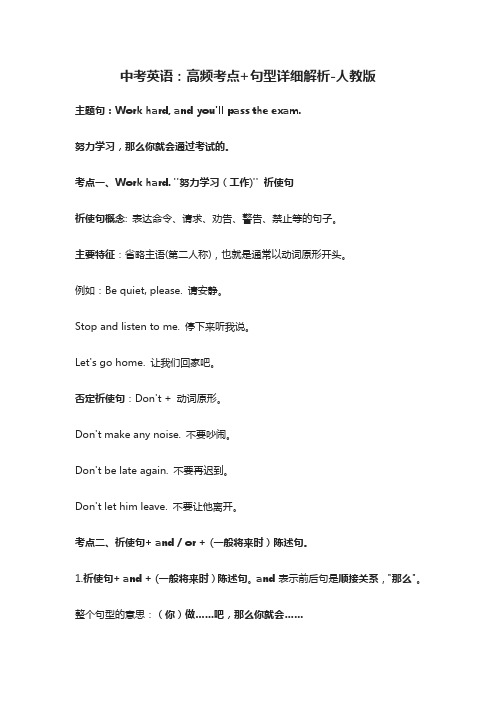
中考英语:高频考点+句型详细解析-人教版主题句:Work hard, and you'll pass the exam.努力学习,那么你就会通过考试的。
考点一、Work hard. "努力学习(工作)" 祈使句祈使句概念: 表达命令、请求、劝告、警告、禁止等的句子。
主要特征:省略主语(第二人称),也就是通常以动词原形开头。
例如:Be quiet, please. 请安静。
Stop and listen to me. 停下来听我说。
Let's go home. 让我们回家吧。
否定祈使句:Don't + 动词原形。
Don't make any noise. 不要吵闹。
Don't be late again. 不要再迟到。
Don't let him leave. 不要让他离开。
考点二、祈使句+ and / or + (一般将来时)陈述句。
1.祈使句+ and + (一般将来时)陈述句。
and表示前后句是顺接关系,"那么"。
整个句型的意思:(你)做……吧,那么你就会……Keep doing sports, and you'll get healthier. 坚持做运动,那么你就会身体好起来。
Get up early, and you'll catch the early bus. 早点起床,那么你就会赶上早班车。
2. 祈使句+ or + (一般将来时)陈述句。
or表示前后句是转折关系,"否则的话"整个句型的意思是:(你)做……吧,否则的话你就会……Work hard, or you won't pass the exam. 努力学习吧,否则你不会通过考试的。
Be careful, or you will make more mistakes. 仔细些,否则你会犯更多错误的。
中考英语复习资料-第三讲-学会介绍及人称代词的使用-人教新目标版
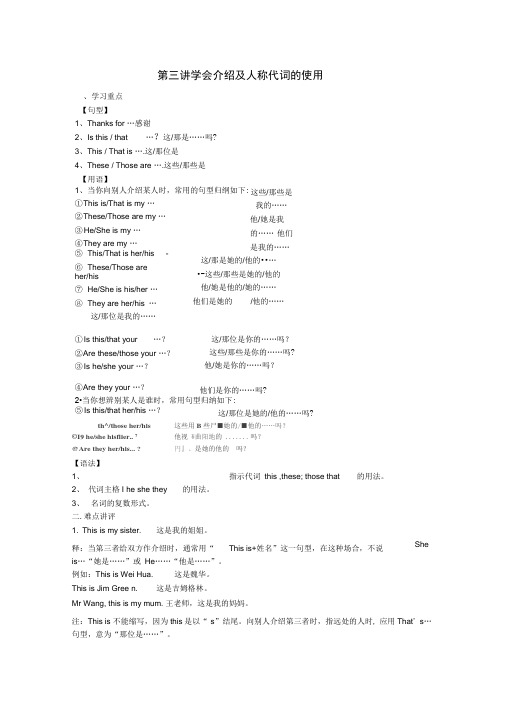
第三讲学会介绍及人称代词的使用、学习重点 【句型】1、Thanks for …感谢2、Is this / that…?这/那是……吗?3、This / That is ….这/那位是4、These / Those are ….这些/那些是【用语】⑤ This/That is her/his -⑥ These/Those are her/his⑦ He/She is his/her … ⑧ They are her/his …这/那位是我的…… 这些/那些是我的…… 他/她是我的…… 他们是我的……这/那是她的/他的••… •-这些/那些是她的/他的 他/她是他的/她的…… 他们是她的/他的……2•当你想辨别某人是谁时,常用句型归纳如下:th^/those her/his这些用B 些尸■她的/■他的……吗? ©I9 he/she hisflier.. 7 他视 ¥曲阳地的 ....... 吗? @Are they her/his... ?円』、是她的他的 吗?【语法】 1、指示代词 this ,these; those that的用法。
2、 代词主格I he she they 的用法。
3、 名词的复数形式。
二.难点讲评 1. This is my sister.这是我的姐姐。
释:当第三者给双方作介绍时,通常用“ This is+姓名”这一句型,在这种场合,不说is …“她是……”或 He ……“他是……”。
例如:This is Wei Hua. 这是魏华。
This is Jim Gree n.这是吉姆格林。
Mr Wang, this is my mum. 王老师,这是我的妈妈。
注:This is 不能缩写,因为this 是以“ s ”结尾。
向别人介绍第三者时,指远处的人时, 应用That ' s …句型,意为“那位是……”。
1、当你向别人介绍某人时,常用的句型归纲如下: ① T his is/That is my … ② T hese/Those are my … ③ He/She is my … ④T hey are my … ① Is this/that your…?② A re these/those your …? ③ Is he/she your …? 这/那位是你的……吗? 这些/那些是你的……吗? 他/她是你的……吗?④ A re they your …?他们是你的……吗? ⑤ Is this/that her/his …? 这/那位是她的/他的……吗?She例如:一Who s that? —It ' s my brother.—那位是谁?一是我的哥哥。
2023年中考英语总复习英语精华知识点全汇总建议收藏
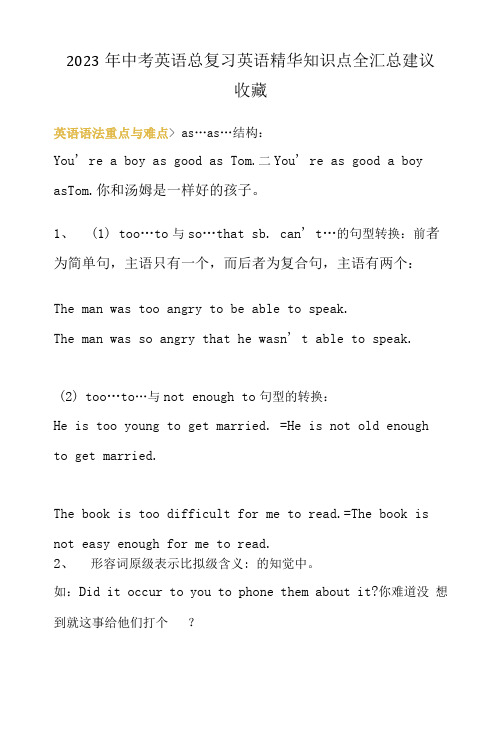
2023年中考英语总复习英语精华知识点全汇总建议收藏英语语法重点与难点> as…as…结构:You' re a boy as good as Tom.二You' re as good a boy asTom.你和汤姆是一样好的孩子。
1、(1) too…to与so…that sb. can' t…的句型转换:前者为简单句,主语只有一个,而后者为复合句,主语有两个:The man was too angry to be able to speak.The man was so angry that he wasn' t able to speak.(2)too…to…与not enough to句型的转换:He is too young to get married. =He is not old enough to get married.The book is too difficult for me to read.=The book isnot easy enough for me to read.2、形容词原级表示比拟级含义: 的知觉中。
如:Did it occur to you to phone them about it?你难道没想到就这事给他们打个?事件作主语时,happen和occur可以通用?如:The accident happened/occurred yesterday. 事故是昨天发生的。
take place指事件发生,但常用来表示“举行”的意思,带有非偶然性?如:The meeting took place last night.会议昨晚举行。
14.in front of, in the front of in front of的意思是“在前面”。
如:There is a tree in front of the house.房子前面有一棵树。
(全)2021中考英语高频考点+句型详细解析-人教
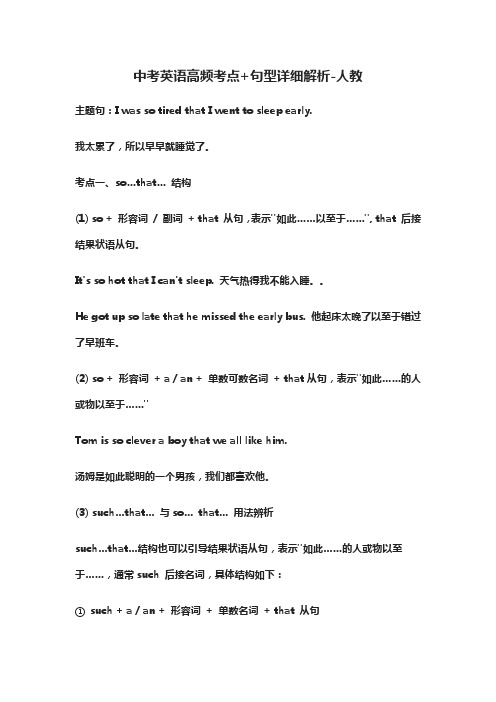
中考英语高频考点+句型详细解析-人教主题句:I was so tired that I went to sleep early.我太累了,所以早早就睡觉了。
考点一、so…that…结构(1) so + 形容词/ 副词+ that 从句,表示"如此……以至于……", that 后接结果状语从句。
It's so hot that I can't sleep. 天气热得我不能入睡。
He got up so late that he missed the early bus. 他起床太晚了以至于错过了早班车。
(2) so + 形容词+ a / an + 单数可数名词+ that从句,表示"如此……的人或物以至于……"Tom is so clever a boy that we all like him.汤姆是如此聪明的一个男孩,我们都喜欢他。
(3) such…that…与so…that…用法辨析such…that…结构也可以引导结果状语从句,表示"如此……的人或物以至于……,通常such 后接名词,具体结构如下:①such + a / an + 形容词+ 单数名词+ that 从句Tom is such a clever boy that we all like him.汤姆是如此聪明的男孩以至于我们都喜欢他。
②such + 形容词+ 复数名词/ 不可数名词+ that 从句It was such bad weather that we had to stay at home.天气如此糟糕以至于我们不得不呆在家里。
They are such interesting books that I want to read them once more.他们是如此有趣的书,我想再次阅读它们。
(4) so…that…与such…that…之间的转换He was such a brave boy that he was praised by the teacher. = The boy was so brave that he was praised by the teacher.这个男孩非常勇敢,因而受到了老师的表扬。
中考英语重点知识归纳中考英语精华知识点汇总

2021年中考英语重点知识归纳中考英语精华知识点汇总学会总结归纳,是同学们在学习的过程中不可缺少的一个环节。
2021年中考英语的重点知识点有哪些呢?下面给大家了2021年中考英语重点知识归纳,希望对大家有所帮助。
1、as…as…结构:你和汤姆是一样好的孩子。
You’re a boy as good as Tom.=You’re as good a boy as Tom.2、(1)too…to与so…that sb. can’t…的句型转换:前者为简单句,主语只有一个,而后者为复合句,主语有两个,试比拟:The man was too angry to be able to speak.The man was so angry that he wasn’t able to speak.(2) too…to…与 not enough to句型的转换:He is too young to get married.=He is not old enough to get married.The book is too difficult for me to read.=The book is not easy enough for me to read.3、形容词原级表示比拟级含义:约翰不象迈克那么苯。
John is not so stupid as Mike.John is less stupid than Mike.John is cleverer than Mike.4、用比拟级表示最高级:约翰是班里最高的男生。
John is taller than any other boy in the class.John is the tallest boy in the class.5、the more….. the more….表示“越……越……”:The more books you read, the wider your knowledge is.The more food you eat, the fatter you are.6、more and more….表示“越来……越……”:More and more students realized the importance of a foreign language.Our country is getting stronger and stronger.1. after, in这两个介词都可以表示“……(时间)以后”的意思after 以过去为起点,表示过去一段时间之后,常用于过去时态的句子中?如:She went after three days. 她是三天以后走的in 以现在为起点,表将来一段时间以后,常用于将来时态的句子中如:She will go in three days. 她三天以后要走2. how long, how often, how soonhow long指多长时间,主要用来对一段时间(如three days,four weeks 等)提问?如:How long ago was it? 这是多久前的事了?how often指每隔多久,主要用来对频率副词或状语(如once a week等)提问?如:—How often does he e here? —Once a month. 他(每隔)多久来一次?每月一次。
中考英语重点句型归纳和应用

中考英语重点句型归纳和应用中考重点句型归纳和应用/doing sth 该是做某事的时候1. It’s time to do sth = It’s time for sth.(该是吃早饭的时候)如:It’s time. = It’s time做某事是某人的责任/荣幸2. It’s one’s duty/ honor to do sth.如:It’s my honor(被邀请到这里做演讲).It’s our duty(保持班级的干净)引导的主语从句3. It’s adj (for sb) to do sth = It’s + adj +that做某事对某人来讲是....如:It’s(不可能在这么短的时间完成工作).It’s(做眼保健操对学生们来讲是有必要的)4. 主语 + adj to do sth = 主语 + adj +that引导的主语从句如: .(认识你很高兴).(我们确信会赢得这次机会)I am excited that .(我通过了这次英语测试)有某人在某地做某事5.There be + sb + Ving +… 如: .有很多的老人居住在这里。
.公园里有很多小孩子在玩。
6. There is something/nothing serious/wrong with... ...有问题/ ...不严重如: .你的自行车出了问题。
.你的眼睛没什么问题。
7. There is no doubt that... 毫无疑问的是 ...如: .毫无疑问的是德国在造车方面起到领先地位。
据说 ... 据报道...8.It’s said/reported that...如: .据报道三分一的中学生没吃早饭去上学。
9. give / pass / show / kick / bring sb sth = give / pass / show / kick / bring sth to sb 如: .请把这封信传给Maria。
[精]中考英语常考的重点句型及短语汇总
![[精]中考英语常考的重点句型及短语汇总](https://img.taocdn.com/s3/m/b7c1f0500c22590103029d51.png)
中考英语常考的重点句型及短语汇总一、重点句型1.So + be/助动词/情态动词/主语.前面陈述的肯定情况也适于另一人(物)时,常用到这种倒装结构,表示“另一人(物)也如此。
”前面陈述的否定情况也适于另一人(物)时,常用“Neither/ Nor + be/助动词/情态动词+主语.”这种倒装结构。
注意:“So+主语+be/助动词/情态动词.”这一句型常用于表示赞同,进一步肯定对方的看法,表示“的确如此。
”“是呀。
”2.Turn right/leftat the first/second/…crossing.这一指路的句型意为“在第一/二/……个十字路口向右/左拐。
”相当于Take the first /second/…turning on theright/left.3.It takes sb.some time to do sth.此句型表示“干某事花了某人一段时间。
”其中的it是形式主语,后面的动词不定式(短语)才是真正的主语.4.…think/find + it + adj. + to do sth.此句型中的it是形式宾语,不可用其它代词替代,形容词作宾语的补足语,后面的动词不定式(短语)才是真正的宾语。
5.What’s wrong with…?此句型相当于What’s the matter/ trouble with…?后跟某物作宾语时,意为“某物出什么毛病了?”后跟某人作宾语时,意为“某人怎么了?”6.too…to…在so…that…复合句中,that后的句子是否定句时,常与简单句too…to…(太……而不能……)进行句型转换。
在so…that…复合句中,that后的句子是肯定句时,常与简单句…enough to…进行句型转换.7.Sorry to hear that.全句应为I’m sorry to hear that. 意为“听到此事我很难过(遗憾)。
”常用于对别人的不幸表示同情、遗憾之意。
中考英语补全对话常用句型全归纳_并附真题及答案

归纳总结功能相同的句型:打电话: This is 谁谁speaking。
我是谁谁。
May I speak to Mr.Li? 我可以和李先生讲话吗? (我找李先生 ? )Speaking.对,我就是。
或者Thisis 谁谁 speaking.(对,我是谁谁。
)Who's that (speaking) 你是谁??或者Who is this,please?This is Tom speaking. 我是Tom。
Is Sue James in? 休·詹姆斯在吗?I'm sorry, he's not in (right now.) He is not here now.(对不起,他出去了。
)Can I take a message for you? 我能给你带个口信吗?Hold on,please! 请稍等一下(怎么了? What's up?/What's the matter ?\What 's wrong?)感谢类:Thanks!Thank you!Thank you very much!答谢类: You are welcome.不必谢.Not at all. 不用谢.道歉类:建议类:Sorry.I am sorry for what I said/didYou had better do-----What about doing. ?How about doing.?Why not do. ?同义句why don't you do----? Let's do .. OK?Would you like some ….?Shall we do...?支持赞同上面建议答语:That's a good idea.\That sounds good.好主意,棒极了同意许可类:OK.Certainly.Of courseI agree with you.不同意类:I am afraid not.Sorry, I don't think so.I really can't agree with you.祝愿祝贺类Have a good(nice)time!Good Luck to you!Best wishes!Congratulations to you!3.熟记“问”字句型问天气:What's the weather like today ?How is the weather today?问时间:What's the time?What time is it?问职业:What's your father?What's your father's job?What does your father do?问价格:What's the price of the book?How much is the book?问年龄:How old are you?What's your age?问住址:where do you live?What's your address?问姓名:What's your name?Can you tell me your name?问爱好:What's your hobby?Which do you prefer?同义句Which do you like better?Which do you like best?问看法感受:What do you think of the film?How do you like the film?问数量:How many-------? (可数东西)How much-------? (不可数东西)问人口:What's the population of China?How many people are there in China?问路:Can you tell me the way to-地点?How can I get to 地点-?Which is the way to the station?问尺寸:What size do you want?What size do you need?问日期:What's the date today?问距离:How far is it?How far is your school from here?问星期:What day is it today?问高度:How tall are you?What's your height?问宽度:How wide is the river?问长度:How long is the bridge?问体重:What's your weight?How heavy is it?问电话:Can I know your telephone number?What's your telephone number?购物:1.Can I help you?-Yes ,please.2.What color do you want ?\What sizes do you want ?\How many do you want ?3.How much is it ?4.Can I try it on ?\ May I try it on ? -Of course.\Sure,you can.5.I'll take it.问路:1.Excuse me?-Yes?2.Can you tell me how to get to .?\Could you please tell me how to.3.Where is ..4.How far is it ?5.How long does it take?6.How can I get to …7.Go straight \Go down. Turn right\left8.Can I ride a bike there ?天气:1.Which season do you like best?2. I like Spring \Summer\Autumn\Winter.(准备、计划要做的)假期,周末活动:(还没有发生,一般将来时)1. What are you going to do on weekend ? where are you going on vacation?2.I am going to ..3.When will you leave ?\When are you going?4.How will you get there?谈论一些发生在过去的事(例如过去的旅游经历、购物经历、看电影经历What did you do yesterday /there ?Where did you go last night?Who did you go with ?How did you go there?How long did you stay there ?Where did you buy it/them?Is it far from here ?---How far is it ?Where have you been ?----I have been to +地点。
中考英语重点句型归纳

中考英语重点句型归纳**中考英语重点句型归纳**1. “It's + adj. + (for sb.) to do sth.”这个句型超级重要哦。
它的意思就是“(对某人来说)做某事是……的”。
比如说,“It's difficult for me to learn English well.”(对我来说学好英语是困难的)。
就像爬山,山很高,要爬到山顶不容易,学好英语就像爬这座高山一样,这个句型就很好地表达出这种感觉。
你难道不觉得这个句型很实用吗?2. “too...to...”结构。
意思是“太……而不能……”。
例如,“He is too young to go to school.”(他太小了以至于不能去上学)。
这就好比一个小杯子,想装一大桶水,根本装不下嘛。
你想啊,如果不掌握这个句型,很多类似这样表达“能力不足”的情况就很难准确说出来,多可惜呀!3. “not...until...”,“直到……才……”。
像这个句子“I didn't go to bed until my mother came back.”(直到我妈妈回来我才上床睡觉)。
这就像在等待一个信号,信号不来,就一直等,就像在车站等一辆很重要的车,车不来就不能出发一样。
你在生活中肯定也有很多这样等待的情况,这个句型能很好地描述呢。
4. “both...and...”,表示“两者都……”。
比如“Both Tom and Jerry like ice cream.”(汤姆和杰瑞都喜欢冰淇淋)。
这就像两个好朋友,他们有着共同的喜好,只要一提到冰淇淋,两个人都会眼睛放光。
如果描述两个人或者两件事物有相同的情况,这个句型就派上大用场了。
5. “either...or...”,“要么……要么……”。
例如,“You can either come wit h me or stay here.”(你要么跟我来,要么就呆在这儿)。
中考英语知识点归纳汇总-详细
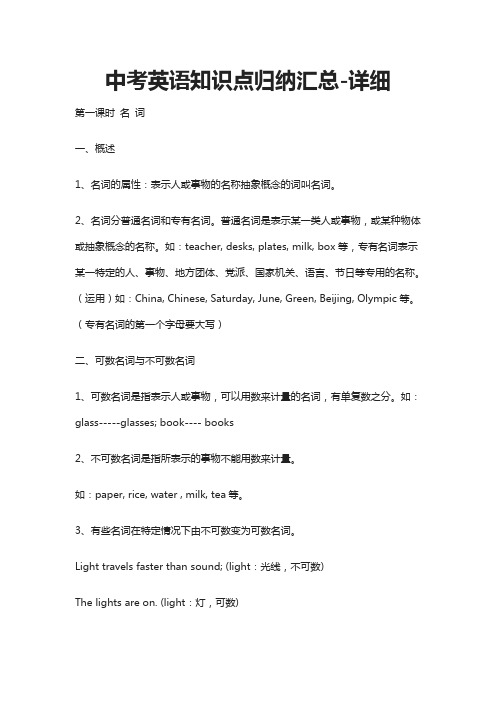
中考英语知识点归纳汇总-详细第一课时名词一、概述1、名词的属性:表示人或事物的名称抽象概念的词叫名词。
2、名词分普通名词和专有名词。
普通名词是表示某一类人或事物,或某种物体或抽象概念的名称。
如:teacher, desks, plates, milk, box等,专有名词表示某一特定的人、事物、地方团体、党派、国家机关、语言、节日等专用的名称。
(运用)如:China, Chinese, Saturday, June, Green, Beijing, Olympic等。
(专有名词的第一个字母要大写)二、可数名词与不可数名词1、可数名词是指表示人或事物,可以用数来计量的名词,有单复数之分。
如:glass-----glasses; book---- books2、不可数名词是指所表示的事物不能用数来计量。
如:paper, rice, water , milk, tea等。
3、有些名词在特定情况下由不可数变为可数名词。
Light travels faster than sound; (light:光线,不可数)The lights are on. (light:灯,可数)4、不可数名词的量的表示不可数名词一般无法用数来计算,前面不能用a或an或数词来表示数量,它的量往往借助于容器来表示。
如:a glass of milk ------ four glasses of milka piece of paper------two pieces of papera bag of rice------three bags of rice三、可数名词的复数形式(识记、运用)1、可数名词在应用时有单复数之分,单数变复数有规则变化和不规则变化两种。
规则变化情况变化形式例词一般情况加-sgirls; books;以s,x,ch,sh结尾的名词加-esclasses; boxes; watches;brushes以辅音字母加y结尾的名词变y为i, 加escity---cities; baby---babies以f或fe结尾的名词变f,fe为v, 加esknife---knives; leaf---leaves以O结尾的名词potatoes; tomatoes;photos; kilos; bamboos; radios 2、少数名词有不规则的变化形式policeman---policemen; man---men; woman---women; tooth---teeth; foot---feet; sheep---sheep; deer---deer; Japanese--- Japanese; Chinese --- Chinese; fish --- fish 四、名词所有格(运用)名词的所有格是表示所有关系的形式,它也有构成上的变化。
北京英语中考50个重点句型
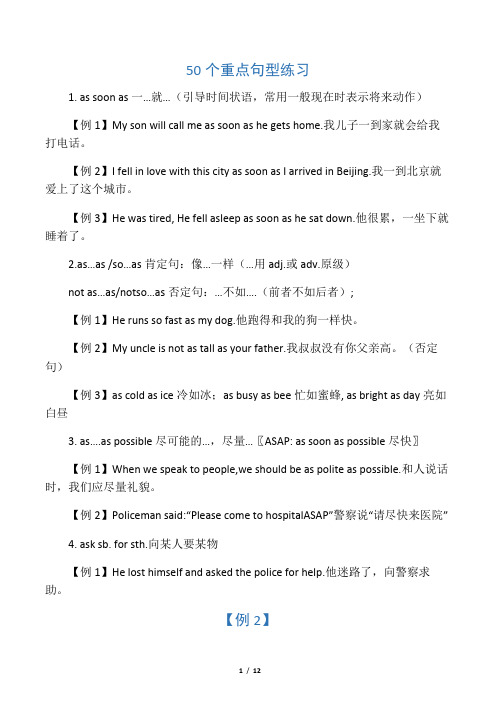
50个重点句型练习1. as soon as一…就…(引导时间状语,常用一般现在时表示将来动作)【例1】My son will call me as soon as he gets home.我儿子一到家就会给我打电话。
【例2】I fell in love with this city as soon as I arrived in Beijing.我一到北京就爱上了这个城市。
【例3】He was tired, He fell asleep as soon as he sat down.他很累,一坐下就睡着了。
2.as…as /so…as肯定句:像…一样(…用adj.或adv.原级)not as…as/notso…as否定句:…不如….(前者不如后者);【例1】He runs so fast as my dog.他跑得和我的狗一样快。
【例2】My uncle is not as tall as your father.我叔叔没有你父亲高。
(否定句)【例3】as cold as ice冷如冰;as busy as bee忙如蜜蜂, as bright as day亮如白昼3. as….as possible尽可能的…,尽量…〖ASAP: as soon as possible尽快〗【例1】When we speak to people,we should be as polite as possible.和人说话时,我们应尽量礼貌。
【例2】Policeman said:“Please come to hospitalASAP”警察说“请尽快来医院”4. ask sb. for sth.向某人要某物【例1】He lost himself and asked the police for help.他迷路了,向警察求助。
【例2】5. ask/tell sb to do sth要求/告诉某人去做某事ask/tell sb how to do sth.询问/告诉某人怎么做某事【例1】My mother askedme to learn this poem by heart yesterday.昨天我妈妈要我背诵这首诗。
中考英语重要句型总结参考

中考英语重要句型总结参考[短语、词组归纳]由动词开头构成的短语、词组许多。
复习时应分类处理:一、动词+介词1.look at…看…, look like …看上去像……, look after …照料…2.listen to…听……3.welcome to…欢迎到……4.say hello to …向……问好5.speak to…对……说话此类短语相当于及物动词,其后需要带宾语,但宾语无论是名词还是代词,都要放在介词之后。
二、动词+副词“动词+副词”所构成的短语义分为两类:A.动词〔vt.〕+副词1.put on 穿上 2.take off脱下 3.write down记住此类短语可以带宾语,宾语假设是名词,放在副词前后皆可;宾语假设是人称代词,只能放在副词的前面。
B.动词〔vi〕+副词。
1.come on赶快 2.get up起床 3.go home回家4.come in进来 5.sit down坐下 6.stand up起立此类短语属于不及物动词,不能带宾语。
三、其它类动词词组1.close the door2.1ook the same3.go to work/class4.be ill5.have a look/seat6.have supper7.1ook young 8.go shopping 9.watch TV/games10. play games[介词短语聚焦]“介词+名词/代词”所构成的短语称为介词短语。
现将Unitsl-16常用的介词短语按用法进行归类。
1.in+语言/颜色/衣帽等,表示运用某种语言或穿着……。
2.in + Row/ Team/ Class/ Grade等,表示“在……排/队/班级/班级”等。
3.in the morning/ afternoon/ evening/ 表示“在上午/下午/傍晚”等一段时间。
4.in the desk/ pencil-bo*/bedroom 等表示“在书桌/铅笔盒/卧房里”。
- 1、下载文档前请自行甄别文档内容的完整性,平台不提供额外的编辑、内容补充、找答案等附加服务。
- 2、"仅部分预览"的文档,不可在线预览部分如存在完整性等问题,可反馈申请退款(可完整预览的文档不适用该条件!)。
- 3、如文档侵犯您的权益,请联系客服反馈,我们会尽快为您处理(人工客服工作时间:9:00-18:30)。
中考英语重点句型归纳和应用中考重点句型归纳和应用1. It’s time to do sth = It’s time for sth/doing sth 该是做某事的时候2. It’s one’s duty/ honor to do sth 做某事是某人的责任/荣幸(被邀请到这里做演讲)(保持班级的干净)3. It’s adj (for sb) to do sth = It’s + adj +that引导的主语从句做某事对某人来讲是...(不可能在这么短的时间完成工作)(做眼保健操对学生们来讲是有必要的)4. 主语 + adj to do sth = 主语 + adj +that引导的主语从句(认识你很高兴)(我们确信会赢得这次机会)(我通过了这次英语测试)5.There be + sb + Ving +… 有某人在某地做某事如: .有很多的老人居住在这里。
公园里有很多小孩子在玩。
6. There is something/nothing serious/wrong with... ...有问题/ ...不严重如: .你的自行车出了问题。
你的眼睛没什么问题。
7. There is no doubt that... 毫无疑问的是 ...如: .毫无疑问的是德国在造车方面起到领先地位。
8.It’s said/reported that... 据说 ... 据报道...如: .据报道三分一的中学生没吃早饭去上学。
9. give / pass / show / kick / bring sb sth = give / pass / show / kick / bring sth to sb如: .请把这封信传给Maria。
请把这封信传给Maria。
你能把照片展示给我们看吗?你能把照片展示给我们看吗?10.see / hear / notice sb doing sth “看到/听到/注意到某人正在做某事”see / hear / notice sb do sth “经常看到/听到/注意到某人做某事”(注意被动态还原to)如: .刚才当我在公园散步时,我看见一些孩子在那里跳舞.。
我经常看见那女孩在我房子前面晨练。
那女孩经常被(我们)听见在体育室唱歌。
11.“花费”句型:主语(人)+spend… (in) doing 花费(时间)做某事主语(人)+spend…on sth 花费(钱)在某物上It take sb +时间 to do sth 做某事花某人...时间主语(物)+cost sb +钱某物花了某人...钱It cost sb +钱 to do sth 做某事花某人...金钱pay..for... 为...花了...钱如: .刚才我花了十分钟打扫教室。
(spend)刚才我花了十分钟打扫教室。
(take)这辆自行车花了我200元。
(cost)这辆自行车花了我200元。
(pay)12. so … that … “如此… 以致于…”,a) 主语 + be + so + adj. + that + 句子(如that引导的从句表否定时,常与too …to ...句型转换.)b) 主语 + 行为动词+ so + adv. + that + 句子c ) so +adj+a/an+n = such+a/an+adj+n如: .它是一个如此重的箱子我们都搬不动。
(so … that …)它是一个如此重的箱子我们都搬不动。
(such… that …)他太小了而不能去上学。
(so … that …)他太小了而不能去上学。
(too … to …)13. so that+从句 = in order that+从句为了,目的是,以便于...in order that+从句= in order to do 为了如: .为了提高我的口语能力,我经常加入英语角。
14. both...and... ...和...either…or… 要么...要么... 或者,,,或者...neither…nor... 都不,既不...也不...not only…but also… 不但...而且...如: .要么周六要么周日我将动身去上海。
我和我姐姐都不喜欢摇滚乐。
我们不但可以从书上,而且可以从因特网上学到知识。
15. ask/tell/encourage/require/invite/allow sb to do sth (主动态)要求/告知/鼓励/要求/邀请/允许某人做某事be asked/told/encouraged/required/invited /allowed to do sth (被动态)某人被要求/告知/鼓励/要求/邀请/允许做某事如: .在中国学生被要求掌握英语。
我不被我父母允许在周末玩电脑游戏。
老师经常告诉我们要尽可能少使用塑料袋。
请告诉游客不要下水游泳。
16. make/let/have sb do sth (主动态:省to的动词不定式)主语+be made/let/had to do sth (被动态:还原to)如: .这个老板让工人们每天工作超过10小时。
工人们被迫每天工作超过10小时。
17.as soon as 一...就... (可遵循主将从现原则)as long as 只要(可遵循主将从现原则)如: .一有危险,你就要报警求助。
只要我们遵守交规,将有更少的事故。
ed to do sth 过去常做某事be used to do sth 被用来做某事be/get used to doing sth 习惯做某事如: .我过去经常集邮。
我的iPad 用来学习英语。
在暑假我不习惯早起。
19. stop doing sth停止正在做的事情 stop to do sth停下去做另一件事 remember doing sth记得做过某事 remember to do sth记得去做某事如: .我太累了,我要停下休息。
请停止吸烟。
在离开班级前,记得关灯。
20.as...as... 和...一样(中间接形容或副词的原级)not as...as... 不如...一样(中间接形容或副词的原级)如: .水灾和暴风雨一样可怕。
他跑地不如我快。
21.adj比+and+adj比: 越来越...(单音节或部分双音节的adj)more and more adj原: 越来越...(多音节的adj)The+比较级,The+比较级:越...., 越...。
如: .天气变得越来越热了。
英语变得越来越重要了。
你吃得越有规律,你越健康。
22.名词,动名词,人称代词(主格),动词不定式可充当主语快乐比财富重要。
熬夜对身体有害。
23.名词,动名词,人称代词(宾格),动词不定式可充当宾语如: .我们应当和好朋友分享快乐。
我的爱好是打篮球。
24.seem用法:seem+adj seem to do sth It seems that...如: .我好像在哪里见过你。
(seem to do sth )似乎他对这次的演讲很自信。
( It seems that... )25.不再...: no longer (句中) not... any longer(句末)如: .我不再感到悲伤了。
我不再感到悲伤了。
26. pay attention to doing / look forward to doing / get used to doingmake a contribution to doing / stick to doing如: .我我一直期待邀请你到我家。
每个人都要注意遵守交规。
27. There be有 There will be / There is going to be将有 There used to be过去有如: .明晚将有一场演唱会。
过去这里有许多的花草树木。
28. as...as possible尽可能的...如: .明早请尽可能早地来上学。
29. ...a way to do ...是做某事的方法如: .微笑是交朋友的好方法。
30. one of the + 最高级 + n(复数)…最......当中的其中之一 (谓语动词用单数)Chang Jiang是世界上最长的河流之一。
31. sth happen to sb 某人发生了某事如: .昨天他发生了一场严重的交通事故。
32. have +n.+ (in) doing sth.have +trouble+ (in) doing sth. 做某事有麻烦have +difficulty+ (in) doing sth. 做某事有困难have +fun+ (in) doing sth. 从...做某事中取得乐趣如: .我与外国人用英语交流有困难。
33.prefer to do sth rather than do sth = would rather do sth than do sth宁愿做...而不愿意做...如: .我宁愿呆在家也不愿外出。
我宁愿呆在家也不愿外出。
34. 现在进行时(be+Ving)表将来:(come, go, fly, travel, leave, arrive, board)如: .一小时后我将飞往美国。
公车快要来了。
35. 比较级的句型(adj比+than other...)表示最高级的意思如: .在中国Chang Jiang比其它河流都长。
36.have gone to去而未归have been to去而已归have been in已经呆了多久(后面跟时间)如: .我去过北京两次。
我曾待在北京有十年。
37. 现在完成时中有短暂性性动词跟一段时间连用,则改为相应的延续性动词。
如: .我加入这个舞蹈俱乐部有三年了。
(join)电影已经开始半小时了。
(begin)这本是你已经借了一星期了。
(borrow)38. provide sb. with sth = provide sth for sb 为某人提供某物如: .我国为学生提供免费的教育。
我国为学生提供免费的教育。
39. be made of 由...制作成(看得出原材料)be made from 由...制作成(看不出原材料)be made into 被做成... 如: .纸张由木头做的。
这些木头被做成纸张。
40. 表示倍数1)“A是B的几倍”的句型是: A + be + 倍数 + adj比 + than + B.2)“A是B的几倍”的另一个句型是:A + be + 倍数 + as +adj原 +as + B.如: .这个工厂是那个工厂的四倍大。
这个工厂是那个工厂的四倍大。
41.“疑问词+to do”结构在句中可以当主语,宾语和表语如: .如何找到一份好工作是很多年轻人的问题。
